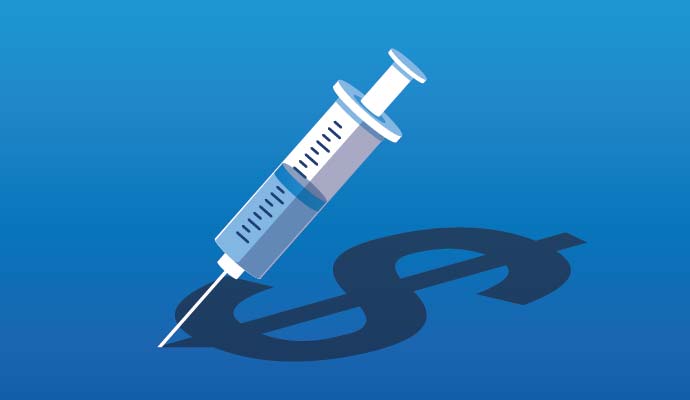Docs Getting Gifts from Drug Companies Prescribed More Opioids
A new study found that physicians who accepted gifts from pharmaceutical companies for the promotion of opioid medications prescribed more of the drugs.

Source: Getty Images
- Gifts from pharmaceutical companies that sold opioid medications led to more opioid prescriptions in the year following gift receipt, a new study from the University of Pittsburgh Graduate School of Public Health revealed.
The study published in the Journal of Pittsburgh Graduate School of Public Health found that physicians who accepted gifts from the pharmaceutical companies were more likely to prescribe opioid medications to patients compared to physicians who did not receive gifts.
Researchers determined the connection using data from Open Payments, a federal program that collects and distributes information from medical device and drug manufacturers about payments and other transfers of value to physicians and teaching hospitals.
“For every 100 Americans, there were 58 opioid prescriptions written in 2017 — that is a tremendous amount of prescribing in a country that is struggling with an opioid epidemic,” lead author Mara Hollander, a doctoral student in Pitt Public Health’s Department of Health Policy and Management, stated in a press release. “Our research points to a potential motivator behind this prescribing that could be reduced through policy interventions.”
According to the latest data from the Centers for Disease Control and Prevention (CDC), the number of opioids prescribed to patients has steadily increased since the 1990s. Meanwhile, the number of overdoses and deaths from prescription opioids also increased.
READ MORE: Opioid Overdose Care Totals $1.94B in Annual Hospital Costs
Almost 218,000 Americans died from overdoses related to prescription opioids from 1999 to 2017, and those deaths were five times higher in 2017 than in 1999, the CDC reported.
Provider prescribing habits may be a leading driver behind these statistics, the study from the University of Pittsburgh Graduate School of Public Health indicated.
The study of over 236,000 physicians included in Open Payments from 2014 to 2015 found gifts from pharmaceutical and medical device companies related to the promotion of opioid medications increased the likelihood of physicians across specialties prescribing opioids to patients.
Specifically, primary care physicians were 3.5 times as likely to be in the highest quartile of opioid prescribing if they received gifts totaling $100 or more, and psychiatrists and neurologists receiving gifts valued at least were 13 times as likely to be in the highest quartile of opioid prescribing versus their peers who received less valuable gifts or no gifts at all.
Researchers also identified the pharmaceutical and medical device manufacturers giving the most gifts for opioid medication promotion.
READ MORE: AHA: Give Funds from Johnson & Johnson Opioid Lawsuit to Hospitals
The study identified 18 different companies giving gifts to providers to promote opioid medications. Of those companies, Insys and Purdue delivered almost two-thirds of the value of those gifts from 2014 to 2015.
Researchers pointed out that both of the companies have settled lawsuits related to their promotion of opioid medications, and Purdue in particular actually stopped marking opioid medications to physicians in 2018.
Researchers also found differences in marketing strategies among pharmaceutical and medical device companies. For example, Mallinckrodt provided three percent of all opioid-related gifts during the study’s period. However, the company was accountable for more than half of the value of the gifts to surgeons, which demonstrated the company’s efforts to market to surgeons in particular.
Provider prescribing habits may unlock the solution to reducing overdoses from opioid prescription drugs.
Many states have already aimed their policies for addressing what they call the opioid crisis at provider prescribing habits. For example, some states have implemented prescription drug monitoring programs (PDMPs), electronic databases that track controlled substance prescriptions throughout the state and provide state health officials with timely information about provider prescribing habits and patient behaviors that led to overdoses and other negative consequences.
READ MORE: AMA, ASAM Create Alternative Payment Model for Opioid Use Disorder
Some states have realized success with PDPM implementation, the CDC reported. For example, in Ohio and Kentucky, morphine milligram equivalent (MME) per capita decreased in 85 percent and 62 percent of counties, respectively, after the state required clinicians to review PDMP data and implement pain clinic regulation. The amounts of opioids prescribed decreased in 80 percent of counties in Florida – a state engaging in multiple interventions on top of PDPM implementation – from 2010 to 2015, CDC also found.
Researchers from the University of Pittsburgh Graduate School of Public Health are calling on policymakers to drill down deeper into provider prescribing habits and what drives those behaviors.
“I would encourage policymakers and state and federal health officials to really dig into these findings and develop interventions that address this relationship between pharmaceutical company gift-giving and opioid prescribing,” senior author Marian Jarlenski, PhD, MPH, assistant professor of health policy and management at Pitt Public Health, explained in the press release.
“The opioid epidemic is nowhere close to being over. Yes, in the past year we’ve seen a leveling off in the rate of overdose deaths, but that masks the huge number of people living with opioid use disorder and the impact that high rates of opioid prescribing continue to have,” she concluded.
